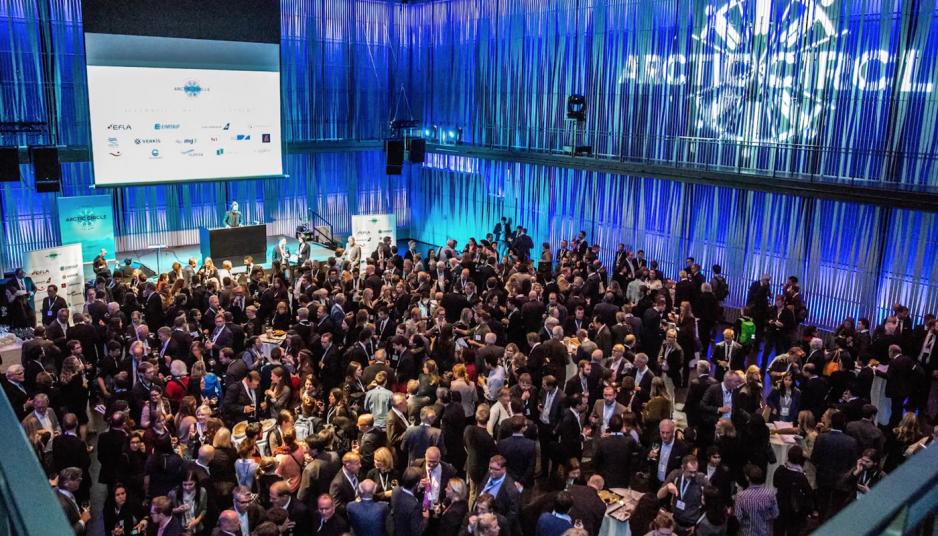7th Arctic Circle Assembly Opens in Reykjavik

The Arctic Circle Assembly (pictured here in 2018) is the largest annual Arctic gathering. (Photo: Arctic Circle Assembly)
Reykjavik’s shining convention centre on the harbour, Harpa, will be home to the largest annual Arctic gathering - the Arctic Circle Assembly - from October 10th to the 13th. High North News is also present.
This year’s edition can boast a record-high number of plenary and breakout sessions and promises to be one of the best attended such conferences to date. With so many options to choose from, it’s hard to not be overwhelmed. We have highlighted several of the questions likely to define this year’s assembly and some of the sessions that tackle them.
High North News is, of course, present in Reykjavik and will keep you posted both on the web site as well as on Facebook.
A changing of the guard in Arctic Governance
The Arctic Circle tends to draw heavy hitters from governments and foreign ministries and this year is no exception.
The former president of Iceland, Ólafur Ragnar Grímsson, will welcome attendees at the opening session. Joining Grímsson in the welcoming session will be the Prime Ministers of Iceland and Finland, the crown princess of Sweden, and Rick Perry, the U.S. Secretary of Energy, along with a slew of other high-profile presenters.
In addition to high-level comments on Arctic policy objectives, likely to figure prominently is the transition in the chairmanship of the Arctic Council, the preeminent regional organization.
Watch for more details on Iceland’s vision for the coming two years at the opening session (as well as a specific follow-up session on Friday morning). Also of interest will be to what extent Reykjavik plans on continuing the Finnish emphasis on economic development and what role will be played by the Arctic Economic Council.
Amidst growing entanglement in the on-going impeachment crisis in the United States, Rick Perry, for his part, is likely to pointedly avoid any related questions and instead stick to his talking points on Alaska’s energy potential.
The Inuit Circumpolar Council lays out the future it wants to see
The Inuit Circumpolar Council (ICC) is well represented at this year’s assembly with a number of sessions on subjects ranging from climate justice to youth empowerment. Expect a particularly large audience for the plenary they co-organized on Saturday morning entitled “Inuit: The future we want.”
Bringing together a diverse array of panelists from the non-profit, government, and private sectors, the conversation promises to be engaging. Watch out in particular for Natan Obed, the dynamic president of Inuit Tapiriit Kanatami (the national Inuit organization of Canada), who has been called the “most important leader many Canadians haven't heard of.”
Arctic languages
Another session on Thursday organized by the ICC focuses on Indigenous languages and culture. Given that 2019 is the United Nations International Year of Indigenous Languages, and that the Inuit in Canada just adopted a common written language, this is a timely intervention.
There are several other sessions on Arctic languages scattered through the programme, including one on preserving Arctic languages from a West Nordic perspective on Saturday afternoon.
Organized by the West Nordic Council, panellists will offer perspectives on Icelandic, Greenlandic, and Faroese.
New Arctic policies
A number of new Arctic policies will be unveiled at this year’s assembly. On Saturday morning the Scottish Minister for Energy, Connectivity, and the Islands, will outline Scotland’s first Arctic policy framework.
With the Scottish National Party in power at the moment, and with an increasingly dramatic Brexit debate playing out at Westminster, it will be interesting to see if Edinburgh sees its future Arctic policy as part of a larger British strategy—or not.
Immediately afterwards Switzerland’s Head of the Sectoral Foreign Policies Division will lay out Switzerland’s Arctic policy. In their application for observer status at the Arctic Council they emphasized the strength of Swiss polar science and that the country was a “vertical Arctic.”
There will also a number of new entrants to the assembly. This includes a ministerial level delegation from Fiji that will speak to climate change impacts on Pacific fisheries on Friday.
Later on Friday, a panel of academics and industry representatives will tackle the question of Brazil and the sustainability of the Arctic.
From Mars to the Arctic
While NASA is already preparing for future Martian missions by spending time in Greenland, panelists at a session on Friday afternoon will be offering insight on the opposite: how Outer Space can help improve the lives of those living in the Arctic.
Bringing together a large and diverse group of panelists—ranging from senior officials from the European and Canadian space agencies to a member of the Saami Council—the panel will focus on remote sensing, facilitating economic growth, and climate science.
